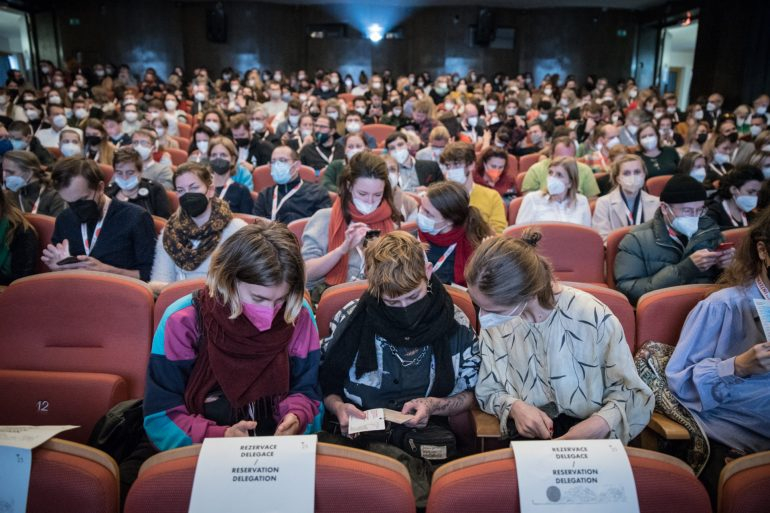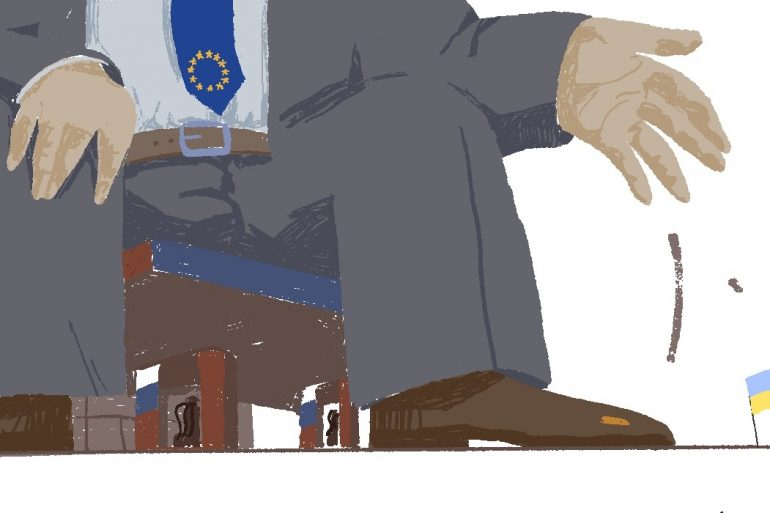It has been 10 years since Theresa May laid out her plans to “create, here in Britain, a really hostile environment for illegal immigrants.” The then-Home Secretary spoke the quiet part of government policy out loud for the first time: a declaration of making life so unbearable for undocumented migrants that they would leave the country.
What has followed has been an ever-expanding series of measures barring migrants from access to basic human rights such as healthcare, housing and work. The government deliberately uses the descriptor of “illegal” immigrants – a category which does not exist, but justifies treating a group of people as undeserving of rights.
Yet the Hostile Environment creates an atmosphere of fear and discrimination even for those regarded by the state as “legal”, as well as Black and brown individuals who have lived in the UK their whole lives, or since they were children.
This year alone has seen an escalation in overt attacks on migrants, from the Rwanda deportation policy to the deportation of a gay man facing threats to his life.
Desire’ and Maria (names changed for anonymity) are two members of the Brighter Futures youth group, run by migrants rights charity Praxis. For them, the implications of the Hostile Environment for migrants in the UK reflect the brutality of Theresa May’s statement.
Long Waits, Uncertainty and Mental Health
For Maria, the policy has “lots of impacts on [your] mental health”, with people waiting “years and years for a decision” on their status. Those arriving without papers used to have to wait 14 years before being eligible for leave to remain.
Since the implementation of the Hostile Environment, this has increased to 20 years. After those 20 years, people are put on the “10 year route”, during which they must spend thousands of pounds every two and a half years to reapply for leave to remain. Only after that can they apply for indefinite leave to remain, or settled status.
There are further rules for those between 18 and 25. If someone in this bracket has lived at least half their life in the UK, they can apply for leave to remain. According to Desire’, however, many face a back and forth process with the Home Office until they eventually pass the 25 year marker, and are put on the prolonged 20 year route.
“Imagine arriving as a 12 year old, having to live here for 20 years – now you’re 32, and you’re not even guaranteed getting your indefinite leave to remain. You then face another extra 10 years of applying four times to remain. So you’re 42. Who’s going to look forward to that in their life?”
This denial of a certain or simple future is one of the gruelling ramifications of long and complex application processes on young migrants’ lives. “Your future is on hold and you don’t even know if you will get your status,” says Maria. Desire’ agrees: “I say all the time that I’m exhausted, I’m tired. And it’s not physically, it’s mentally. I really don’t have words to describe it sometimes.”
The Home Office has previously stated that delaying access to settlement is a “matter of principle”. But the experiences of young migrants facing this “principle” expose the cruel intent at the heart of the Hostile Environment: a callous doctrine which aims to make people’s lives intolerable.
Borders and Bureaucracy
The aggression of the Hostile Environment is explicit and shameless. Its policies are not simply long bureaucratic procedures, but the weaponisation of bureaucracy. And it’s the most vulnerable who are its victims. Desire’ says that: “people are scared to go to their GP when they have things that are happening to them because they’re worried about being asked for their status.”
Although all migrants have a right to access free primary care, NHS Trusts are now required to verify eligibility for care up front. Medical professionals are increasingly expected to enforce borders, eroding relationships of trust and discouraging people from seeking help.
The insidious creep of borders into the public sector is visible in education too, with teachers and lecturers also expected to act as immigration officials. Yet many migrants don’t even get as far as accessing these spaces.
For undocumented migrants, Desire’ points out that “access to education stops at 18 because after college you can’t really get funds as you aren’t allowed to apply for student loans.”
For Desire’, this is one of the many ways in which those with no recourse to public funds (NRPF) are barred from participation in what is “the bare minimum for a typical British person.” Maria agrees that “you should be able to access skills and internships for your future when you get your status, so that you have something to look forward to.”
No Recourse to Public Funds: Fear and Isolation
Anxiety around what the future holds is something Maria and Desire’ consistently return to, and it’s clear that the NRPF policy is not just financial, but leads to fear and isolation. The educational barriers for those under NRPF create “a wall for progress for people and that affects their mental state”, according to Desire’. “People will isolate themselves because they feel like they can’t match up to a ‘normal’ person in society.”
What’s more, sometimes this isolation can have more immediate and dangerous consequences. “Women that are in violent relationships can’t get help” – because those with an NRPF status have no access to the welfare benefits and rights to housing that might aid them to escape abuse.
As Desire’ makes clear, the NRPF policy is one of “the key elements that affect women in particular,” and also highlights the essential need for secure, safe accommodation.
Under the Hostile Environment, migrants are housed in a range of situations, including hotels and Home Office accommodation. But as Maria points out, “sometimes the Home Office rehouses you in different places”. The instability of being moved, potentially as far as the other side of the country, can further contribute to isolation. “People start to create a personal life and get to know people in the community, so it’s sad that the Home Office tends to move them around quite a lot”, says Desire’.
Subscribe to shado's weekly newsletter
Exclusive event news, job and creative opportunities, first access to tickets and – just in case you missed them – our picks of the week, from inside shado and out.

Unlivable Accommodation and Privatisation
Aside from the uncertainty that comes from being uprooted, the accommodation itself is often inadequate for basic needs. “You have a shared room, you don’t have your own privacy,” Maria remarks. With long waiting times, people are also forced to wait out lengthy application procedures in hotels, “not being able to eat proper balanced food, with no access to kitchens. The food they give you is something they wouldn’t eat themselves,” Desire’ says.
Inhumane conditions in hotels housing asylum seekers have been reported across the UK, from Sheffield to Glasgow. And it’s only getting worse. Desire’ tells me that “everything is getting harder for people” in Home Office accommodation. She recently heard from a group member that “when she got back her door was broken. They broke her door to enter her room… People could steal her stuff, she’s in danger.”
The immigration system has been increasingly privatised since 2012, and lucrative contracts are handed to companies to run accommodation. Does this make things worse? “It does make it harder,” says Desire’“They just do whatever they like.” While migrants face inedible food and broken locks, she says companies are “making money regardless of whatever situation or hostile environment they put people in.”
Racist, xenophobic borders are fast becoming a booming business for companies. “It’s really hard to get to them because they’re privately owned, so they follow their own system of doing things,” says Desire’. When the lives of those caught up in the asylum system become profit incentives, it becomes harder to fight the violent policies of the hostile environment.
So What Are the Solutions?
“We could start with taking away Priti Patel,” Desire’ suggests with a laugh. More broadly, though, the two women point to widening access: to healthcare, education and liveable accommodation.
Desire’ would like to see “courses, apprenticeships and internships. Just make the education access a bit wider.” As well as this, “if they could just reduce the years migrants have to wait for their asylum status, it will ease pressure from their lives.”
Maria agrees that action on the length of waiting times and application procedures is much needed. She also hopes the government will change the system and improve accommodation, privacy and food quality. She believes that “if people can have their own individual rooms and a kitchen where they cook their meals by themselves, the process of waiting on decisions will be made a little easier.”
Community Care and Organising
And what can individuals and communities do to alleviate the situations that migrants find themselves in?
According to Maria, “lots of communities help their migrants.” Recent successful attempts to halt immigration raids, such as in Glasgow, Peckham and Edinburgh, have shown communities coming together to support their migrant neighbours. She also thinks that groups like Brighter Futures are helpful, as “you can speak to people, whether you’re ‘illegal’ or not. You feel like yourself. You’re equal.”
For Desire’ too, groups like this help enormously with feelings of isolation. “Before joining this group I didn’t have friends, I didn’t socialise – I just existed, basically.” She encourages people to join a campaign, or call in to community groups and organisations and “see what it’s all about.”
The Hostile Environment is an expansive web of intentionally cruel policies, with disastrous results for the mental health and wellbeing of those it entangles. Looking forward, it’s in community care and action that we will find ways to combat the effects of a callous and dehumanising system.
What can you do?
Below are some links to Praxis resources:
- Campaign group to abolish NRPF
- Sign up to Praxis newsletters
- Find out more about the experience of those seeking asylum in the UK and Europe in shado issue 01
Other groups and resources for combatting the Hostile Environment















